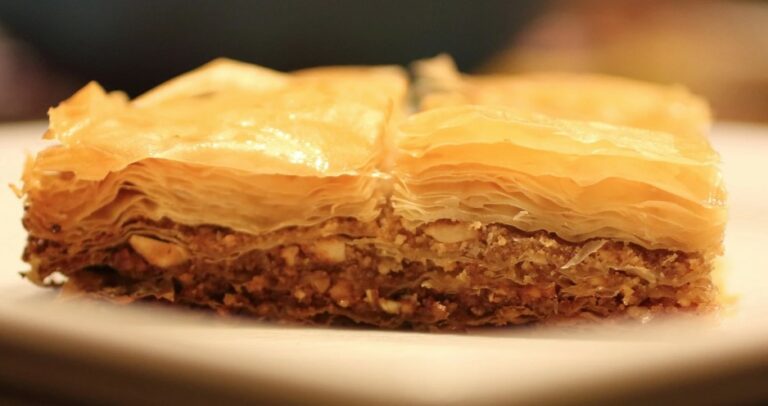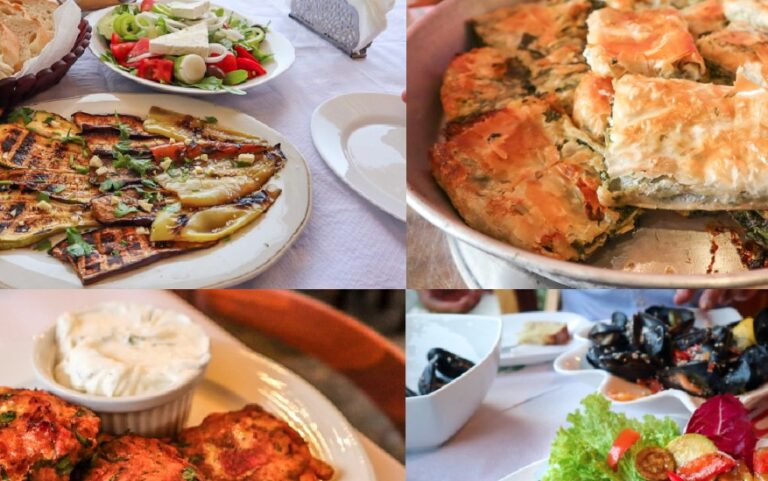Introduction: Traditional Albanian cuisine
Albanian cuisine is a fusion of Mediterranean and Balkan flavors, with influences from Turkish and Italian cuisine. Albanian food is known for its simplicity and use of fresh ingredients such as vegetables, herbs, and meat, making it healthy and flavorful. The cuisine varies regionally, with each area having its own unique dishes and cooking styles. Some of the must-try traditional Albanian dishes are discussed below.
Byrek: A savory pastry dish
Byrek is a popular Albanian pastry dish that is made with layers of filo dough, cheese, and spinach or meat filling. There are different variations of byrek, with some regions adding yogurt or egg to the filling. Byrek is typically served as a snack or breakfast food and is often accompanied by a cup of yogurt or a cup of tea.
Tavë Kosi: A baked lamb dish
Tavë Kosi is a traditional Albanian lamb dish that is baked with yogurt and eggs. The lamb is marinated with garlic, onion, and vinegar before it is baked. The dish is typically served hot, topped with fresh mint leaves and accompanied by a side of bread. Tavë Kosi is a favorite dish during the winter months and is also served during special occasions such as weddings and festivals.
Fërgesë: A mixed meat and vegetable dish
Fërgesë is a hearty Albanian dish made with mixed meat and vegetables. The dish typically includes green peppers, onions, tomatoes, and feta cheese, as well as a combination of meats such as beef, lamb, and sausage. Fërgesë is often served with a side of bread and is a popular dish during the summer months and at family gatherings.
Qofte: Albanian meatballs
Qofte are traditional Albanian meatballs that are made with ground beef, onion, and herbs. The meatballs can be grilled or fried and are often served with a side of potatoes or rice. Qofte is a popular street food in Albania and is often served with a spicy dipping sauce.
Baklava: A sweet pastry dessert
Baklava is a sweet pastry dessert that is made with layers of filo dough, honey, and chopped nuts. The dessert is often served during special occasions such as weddings and festivals and is a favorite among Albanians. Baklava is also popular in other Mediterranean and Middle Eastern countries.
Flia: A layered pancake dish
Flia is a layered pancake dish that is made with cornmeal, flour, and water. The batter is poured onto a heated dome-shaped pan and cooked until it forms a thin, crispy layer. The process is repeated several times until a stack of pancakes is formed. Flia is typically served with a side of yogurt and honey.
Japrak: Stuffed grape leaves
Japrak is a traditional Albanian dish made with stuffed grape leaves. The filling typically includes rice, herbs, and ground beef or lamb. The grape leaves are rolled and boiled until they are tender and the filling is cooked. Japrak is often served as an appetizer or side dish and is a popular dish during the summer months.
Conclusion: Albanian cuisine is diverse and delicious.
Albanian cuisine is a unique blend of Mediterranean and Balkan flavors, with influences from Turkish and Italian cuisine. The food is simple, healthy, and flavorful, making it a must-try for anyone visiting Albania. The dishes discussed above are just a few examples of the many delicious traditional Albanian dishes that are available. Whether you are a fan of savory pastries or sweet desserts, there is something for everyone in Albanian cuisine.


